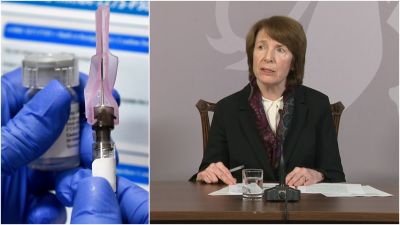Pfizer Covid vaccine: 'It's well prepared and we're ready to roll into action'

The Pfizer/BioNTech Covid-19 vaccine was put through an "extremely thorough and scientifically rigorous review" before being given clinical approval by the UK's medicines regulator.
Dr June Raine, head of the Medicines and Healthcare products Regulatory Agency, insisted their review of the vaccine met "strict standards of safety, of effectiveness and of quality".
She said the the vaccine is "well prepared" and the UK is "ready to roll into action now" to deploy the vaccine.
The head regulator said the UK had become the first country in the world to authorise the a Covid-19 vaccine because experts had worked "round the clock, carefully, methodically poring over tables and analyses and graphs on every single piece of data".
She added: "If you are climbing a mountain, you prepare and prepare. We started that in June.
"By the time the interim results became available on November 10 we were at base camp and then when we got the final analysis we were ready for that last sprint that takes us to today.
"That is the exemplary nature of the work that has been done and the public deserve nothing less."
Senior respiratory physician Prof Wei Shen Lim, who sits on the Joint Committee on Vaccination and Immunisation said he hoped that in the first phase of the vaccine programme 99% of the UK's most clinically vulnerable would be vaccinated.
Health secretary Matt Hancock told BBC Breakfast 800,000 doses of the vaccine will be available next week, with “several millions” more coming throughout December.Prof Wei Shen Lim conceded that there may be some "operational constraints" in delivery of the vaccines to care homes - residents of which are some of the most vulnerable to coronavirus - due to the way it is stored at -70 degrees.
"The JCVI's advice is that every effort should be made to supply vaccines and offer vaccinations to care home residents, whether or not that is actually doable is dependent on deployment and implementation."
But Prof Sir Munir Pirmohamed, chair of Commission on Human Medicine expert working group, said the vaccine is "stable for a short period of time at two to eight degrees, which allows it to be transported to the relevant vaccination sites."
He said people given the vaccine would become immune seven days after the second dose, although there would be partial protection 12 days after the first dose.
A priority list for the vaccine has been released because experts expect "supply will be limited in the first instance", said Prof Wei Shen Lim.
The UK and the wider world will need "as many vaccines as we can get" in order to reach all those at risk.
"This is the start of a programme and not the end of a programme," he said.